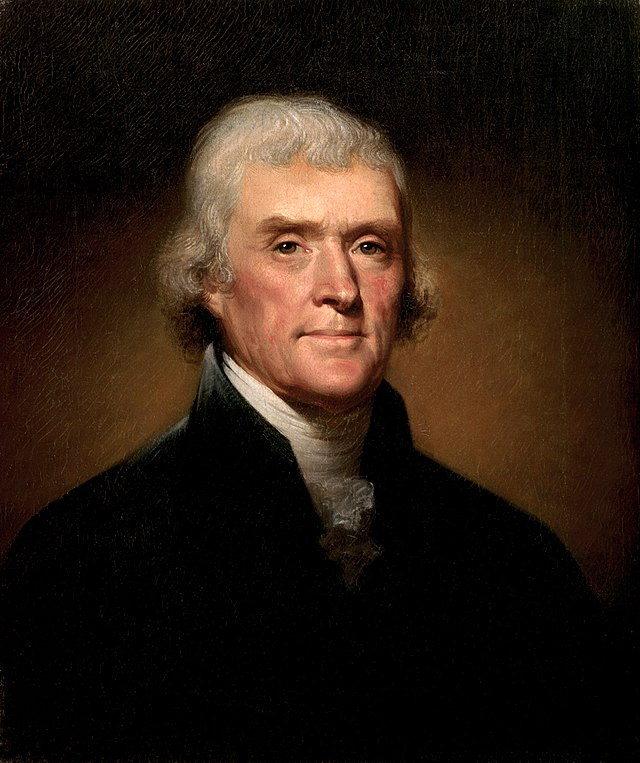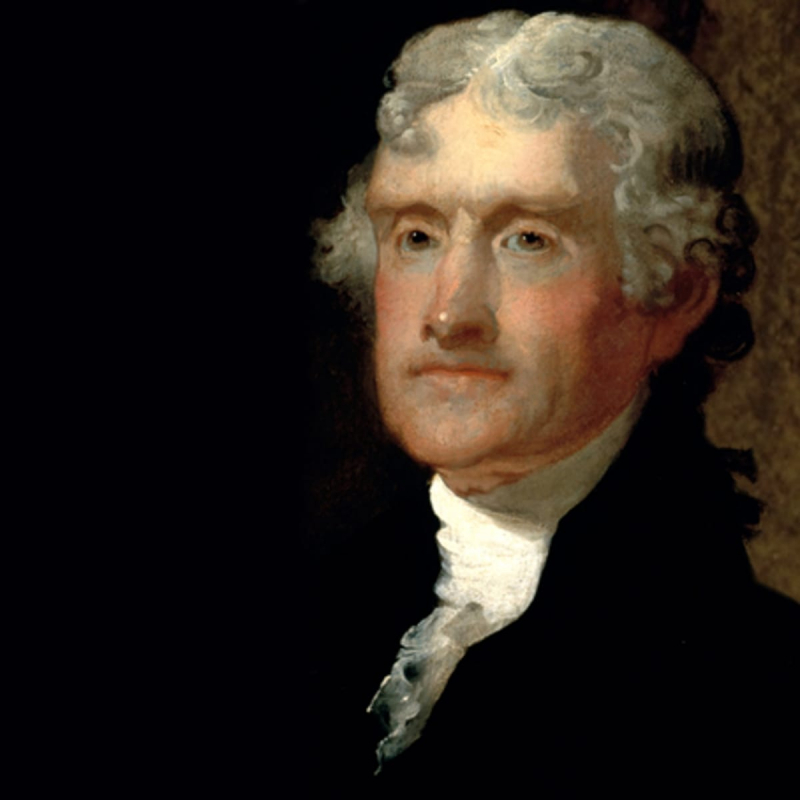Thomas Jefferson
Thomas Jefferson (April 13, 1743 - July 4, 1826) was an American statesman, diplomat, lawyer, architect, philosopher, and Founding Father who served as the country's third president from 1801 to 1809. He had previously served as John Adams' second vice president and George Washington's first secretary of state. Jefferson, the Declaration of Independence's principal author, was a proponent of democracy, republicanism, and individual rights, inspiring American colonists to secede from the Kingdom of Great Britain and form a new nation. At the state, national, and international levels, he produced formative documents and decisions.
Jefferson represented Virginia in the Continental Congress that adopted the Declaration of Independence during the American Revolution. As a Virginia legislator, he drafted a religious freedom bill. During the Revolutionary War, he was the second Governor of Virginia, serving from 1779 to 1781. Jefferson was appointed as the United States Minister to France in 1785, and then as the country's first Secretary of State under President George Washington from 1790 to 1793. During the formation of the First Party System, Jefferson and James Madison founded the Democratic-Republican Party to oppose the Federalist Party. In 1798 and 1799, he and Madison collaborated on the controversial Kentucky and Virginia Resolutions, which sought to strengthen states' rights by repealing the federal Alien and Sedition Acts.
While serving in the Continental Congress and co-writing the Declaration of Independence, Jefferson and Federalist John Adams became friends as well as political rivals. In the 1796 presidential election, Jefferson finished second, which, according to electoral procedure at the time, made him Adams' vice president. In 1800, Jefferson challenged Adams again and won the presidency. Jefferson and Adams eventually reconciled after Jefferson's presidency, and they corresponded for fourteen years.
As president, Jefferson fought Barbary pirates and aggressive British trade policies to protect the nation's shipping and trade interests. Beginning in 1803, he promoted a western expansionist policy with the Louisiana Purchase, which more than doubled the country's claimed land area. To make way for settlement, Jefferson began the process of removing Indian tribes from newly acquired territory. His administration reduced military forces as a result of peace talks with France. He was re-elected in 1804, but his second term was marred by domestic issues, such as the trial of former Vice President Aaron Burr. When Jefferson enacted the Embargo Act in response to British threats to American shipping in 1807, it reduced American foreign trade. Jefferson also signed the Act Prohibiting the Importation of Slaves the same year.
While Jefferson was primarily a plantation owner, lawyer, and politician, he was also a skilled surveyor, mathematician, horticulturist, and mechanic. In addition, he was a Palladian architect. Jefferson's keen interest in religion and philosophy led to his presidency of the American Philosophical Society; he shied away from organized religion but was influenced by Christianity, Epicureanism, and deism. Jefferson was a staunch opponent of fundamental Christianity, denying Christ's divinity. Jefferson was a philologist who spoke several languages. He was an avid letter writer who corresponded with many notable figures, including Edward Carrington, John Taylor of Caroline, and James Madison. Notes on the State of Virginia (1785), one of his books, is regarded as the most important American book published before 1800. Jefferson advocated for the Enlightenment's ideals, values, and teachings.
Jefferson owned over 600 slaves over the course of his life. Since Jefferson's time, there has been much debate about his relationship with Sally Hemings, a mixed-race enslaved woman who was his late wife's half-sister. According to DNA testing of Jefferson's and Hemings' descendants in 1998, as well as documentary and statistical evidence and oral history, Jefferson fathered at least six children with Hemings, four of whom survived to adulthood. Evidence suggests that Jefferson and Hemings began their relationship in Paris, sometime after she arrived there at the age of 14 or 15, when Jefferson was 44. She was pregnant by the time she returned to the United States at the age of 16 or 17.
Jefferson established the University of Virginia after leaving public office. Both he and John Adams died on July 4, 1826, the 50th anniversary of the United States' independence. Jefferson's public achievements are generally lauded by presidential scholars and historians, including his advocacy of religious freedom and tolerance in Virginia, his peaceful acquisition of the Louisiana Territory from France without war or controversy, and his ambitious and successful Lewis and Clark Expedition. Jefferson's personal involvement with slavery has been criticized by some modern historians. Jefferson is regarded as one of the top ten presidents in American history.












